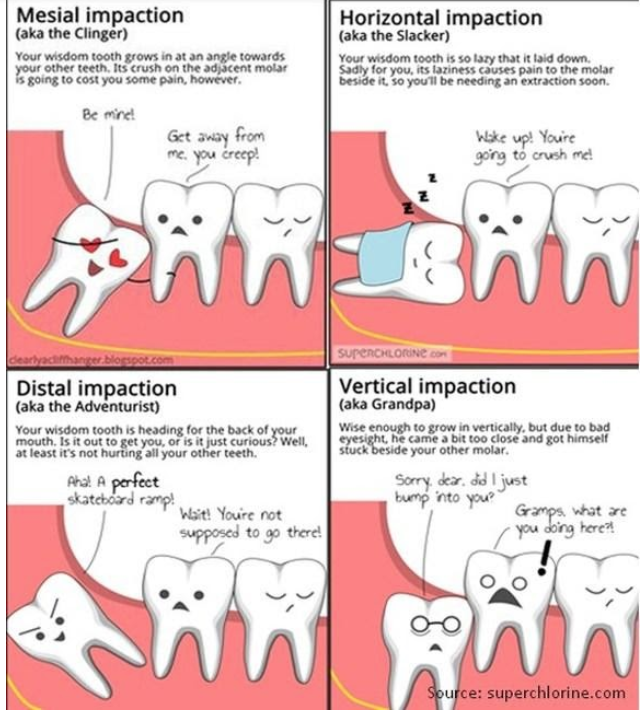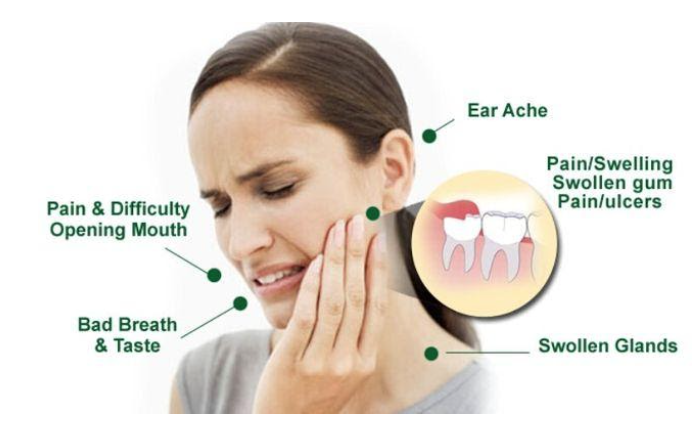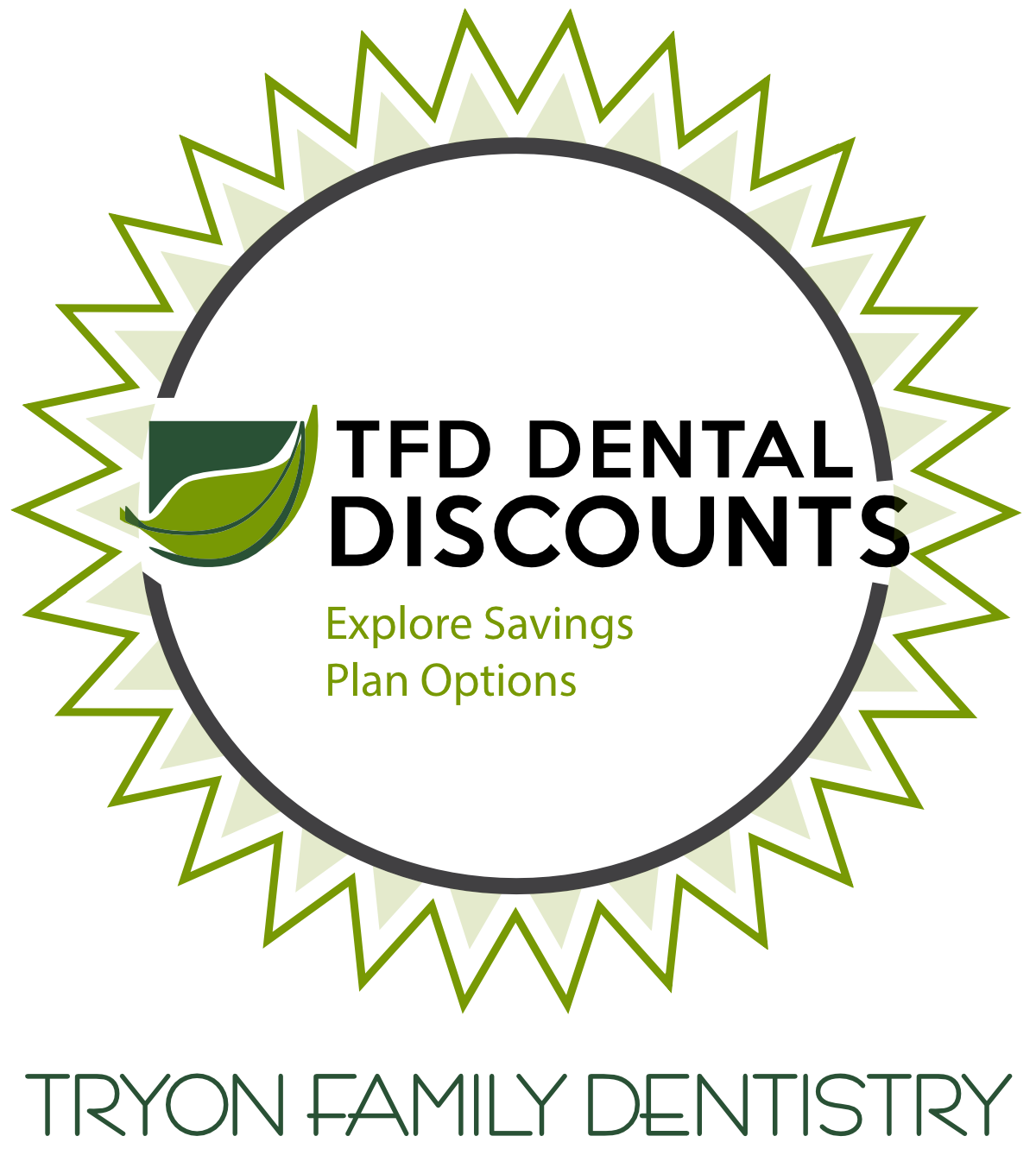Everyone out there has a different opinion on wisdom teeth. Why you have them and if you should keep them, among others. First, let’s start with the facts.
- Wisdom teeth are your third molars and typically come in between the ages of 17 and 25.
- Some people have them and others simply, do not.
- There is no one-size-fits-all approach to dealing with them, it is dependent on your teeth and how the wisdom teeth have formed.
Instead of leaving it up to hearsay, let’s find out what the doctors at Tryon Family Dentistry have to say about wisdom teeth.
What are wisdom teeth?
Dr. Leo: Third molars, or more commonly called “wisdom teeth”, are the last teeth to erupt in the mouth. For this reason, these teeth rarely have the room to erupt properly. This lack of room causes the teeth to growth in altered directions. Wisdom teeth don’t always have to be removed though, if by chance the patient has a large enough Maxilla and Mandible to allow for the teeth to erupt properly, the teeth can be left. Unfortunately, this is generally not the case.

Dr. Bryant: Wisdom teeth are just molars that humans have evolved past the need for and due to this, most people’s jaws can’t accommodate the space for them to erupt correctly. Wisdom teeth do not make you wiser, they’re just weird! Some people develop wisdom teeth with multiple roots, some with weird angulation, and others (me lol) do not develop them at all!
Dr. Hamilton: Wisdom teeth is a lay term; they’re actually called your third molars. Most people have them, but not all people do. There are some people who can have only one or up to six or even eight. Not many people who are born with wisdom teeth have room for them in the back of their mouth where they come in. It’s better and easier to be born without them all together.
When should you get your wisdom teeth removed?
Dr. Leo: Ideally, we like to get these teeth out at an early age and before they cause any problems to the other dentition. Removing these teeth when the patient is young is beneficial because the roots are not fully formed/the bone is not as dense/a patient at a younger age can recover more quickly.
Dr. Bryant: Ideally, it is best to have your wisdom teeth out before the age of 30 due to ease of removal from root formation. Therefore, it is best to see a dentist for evaluation of your wisdom teeth beginning around age 18. Even if they have not grown in, we are able to assess them on X-ray to determine if it would be best to remove them prior to eruption.
Dr. Hamilton: It’s best to get them evaluated in your teenage years by taking a panoramic radiograph so we can see how they are coming in and affecting your mouth as a whole. With this we are able to see the position of the teeth (if you have any) and monitor for changes. It’s easiest to extract the third molars when the root has not fully formed, and it is easier to heal from a procedure like this when you are younger. Third molars oftentimes can cause problems when someone is/has undergone orthodontic treatment, as they can cause the other teeth to shift.
Why do some people need to get them extracted?

Dr. Leo: Wisdom teeth removal is recommended for multiple reasons. One reason is if the teeth are going to affect the other teeth in the mouth, i.e., causing shifting of teeth or decay of the 2nd molar. Also, the mis-erupted tooth can cause a periodontal infection called pericoronitis that can be very painful to the patient. The final common reason is cyst formation. This cyst will form around an impacted tooth causing resorption of the bone, this is a problem because the bone will resorb around the 2nd molar and will require grafting to save the teeth. During routine hygiene appointments our staff regularly screens patients for present or future problems with these teeth.
Dr. Bryant: Some people have enough room for their wisdom teeth to grow in without problems, but they need to see their dentist regularly to ensure no cavities or other issues are developing. Wisdom teeth are very far back in the mouth, so it is very easy for cavities to form on them and go undetected until they turn painful. Multiple issues can occur with wisdom teeth including tooth, bone, and gum infections. Untreated problems with wisdom teeth can also affect the teeth around them so it is important to get them evaluated before any issues can develop.
Dr. Hamilton: It is best to have third molars removed before they have the opportunity to get infected, as it is harder to extract them when they are infected. Also, when there are upper and lower third molars, you can’t take one of those out, you need to take them both out because if there is only one it will continue to grow out until it is causing problems with the opposite gum. People also get them extracted when they are causing pain. Some people say it feels like they’re teething, while others say it radiates in their jaw. It all depends on the person and the positioning of the teeth in the mouth.
How are your wisdom teeth extracted?
Dr. Leo: At Tryon Family Dentistry, our wisdom teeth are extracted under IV sedation to make the experience as comfortable as possible. This also allows us to administer pain medicine through the IV allowing for a much more comfortable postoperative experience. We also use i-PRF in the extraction sites. i-PRF is platelet rich fibrin extracted from the patient’s blood which accelerates the healing time often leading to a 24hour recovery period.
Dr. Bryant: At Tryon Family Dentistry, we offer multiple options for safe and comfortable wisdom tooth removal including IV sedation as well as laughing gas and oral sedation. We also offer the option to utilize LPRF treatment with our wisdom tooth surgeries in order to expedite healing and lower post-op discomfort for our patients.
Dr. Hamilton: There are a couple different ways you can have your third molars extracted. One being a simple extraction where the tooth is lifted away from the gum and essentially pulled or twisted out. This is what is done when the teeth are fully erupted and not impacted at all. The other way is a more complicated surgical extraction that is done when the teeth are impacted or below the gums. This can be done under general anesthesia or through IV sedation. During this procedure, the tooth may have to be sectioned and removed that way depending on their positioning in relation to the other teeth in the mouth. This is more common with the bottom ones.

